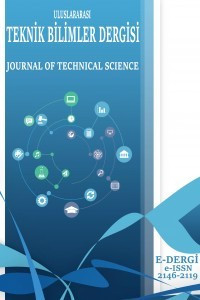Utilizing an Artificial Intelligence Model to Estimate Performance Coefficients in Absorption Cooling Systems
Öz
Absorption cooling system is a cooling method used to transfer heat from one environment to another. In this system, the refrigeration cycle is based on a chemical reaction between two different fluids that absorb and expel heat. Generally, the absorption refrigeration system includes a refrigeration fluid and an absorbent heat absorbing fluid. Artificial intelligence is a field of science and engineering that aims to enable computer systems to have human-like intelligence. Artificial intelligence aims to enable computers to perform tasks such as data analysis, pattern recognition, learning, problem solving and decision making. In this study, the change of the inlet and outlet pressure values of the generator in the absorption cooling system and the prediction of the system performance (COP) value with the artificial intelligence model were studied.
Anahtar Kelimeler
Kaynakça
- [1] Gasiorowski, A., & Gnatowska, R. (2018). Absorption Refrigeration Systems: An Overview. Energies, 11(7), 1779. doi:10.3390/en11071779
- [2] Dincer, I. (2002). Refrigeration Systems and Applications. John Wiley & Sons.
- [3] Li, Y., & Wang, R. Z. (2010). Absorption Refrigeration Technologies and Applications. CRC Press.
- [4] Goswami, D. Y., & Vijayaraghavan, S. (2000). Principles of Refrigeration. CRC Press.
- [5] Herold, K. E., Radermacher, R., & Klein, S. A. (2003). Absorption Chillers and Heat Pumps. CRC Press.
- [6] Wang, R. Z. (2010). Advanced Absorption Chillers: Thermal and Chemical Principles, Modeling and Applications. Springer.
- [7] Reddy, B. V. (2016). Solar Energy: Fundamentals, Design, Modelling and Applications. Academic Press.
- [8] Russell, S. J., & Norvig, P. (2016). Artificial Intelligence: A Modern Approach. Pearson.
- [9] Goodfellow, I., Bengio, Y., & Courville, A. (2016). Deep Learning. MIT Press.
- [10] Luger, G. F., & Stubblefield, W. A. (2014). Artificial Intelligence: Structures and Strategies for Complex Problem Solving. Pearson.
- [11] Nilsson, N. J. (2014). Artificial Intelligence: A Guide to Intelligent Systems. Morgan Kaufmann.
- [12] Kurzweil, R. (2005). The Singularity is Near: When Humans Transcend Biology. Penguin Books.
- [13] Bayır F. Yapay Sinir Ağları ve Tahmin Mo¬dellemesi Üzerine Bir Uygulama Yayınlanmamış Yüksek Lisans Tezi, İstanbul, İstanbul Üniversitesi Sosyal Bilimler Enstitüsü, 2006.
- [14] Labus, J., Bruno, J. C., & Coronas, A. (2013). Performance analysis of small capacity absorption chillers by using different modeling methods. Applied Thermal Engineering, 58(1-2), 305-313
- [15] Şencan, A., Yakut, K. A., & Kalogirou, S. A. (2006). Thermodynamic analysis of absorption systems using artificial neural network. Renewable Energy, 31(1), 29-43.
Öz
Absorpsiyonlu soğutma sistemi, ısıyı bir ortamdan başka bir ortama aktarmak için kullanılan bir soğutma yöntemidir. Bu sistemde, soğutma döngüsü, ısıyı emen ve ısıyı dışarı atan iki farklı akışkan arasındaki kimyasal bir reaksiyona dayanır. Genel olarak, absorpsiyonlu soğutma sistemi, bir soğutma için kullanılan akışkan ve bir absorban ısıyı emen akışkan içerir. Yapay zeka, bilgisayar sistemlerinin insan benzeri zekaya sahip olmasını sağlamayı amaçlayan bir bilim ve mühendislik alanıdır. Yapay zeka, bilgisayarların veri analizi, örüntü tanıma, öğrenme, problem çözme ve karar verme gibi görevleri gerçekleştirebilmesini hedefler. Bu çalışmada absorbsiyonlu soğutma sisteminde ki jeneratörün giriş ve çıkış basınç değerlerinin değişimi ile sistem performansının (COP) değerinin yapay zeka modeli ile tahmin edilmesi üzerine çalışılmıştır.
Anahtar Kelimeler
Kaynakça
- [1] Gasiorowski, A., & Gnatowska, R. (2018). Absorption Refrigeration Systems: An Overview. Energies, 11(7), 1779. doi:10.3390/en11071779
- [2] Dincer, I. (2002). Refrigeration Systems and Applications. John Wiley & Sons.
- [3] Li, Y., & Wang, R. Z. (2010). Absorption Refrigeration Technologies and Applications. CRC Press.
- [4] Goswami, D. Y., & Vijayaraghavan, S. (2000). Principles of Refrigeration. CRC Press.
- [5] Herold, K. E., Radermacher, R., & Klein, S. A. (2003). Absorption Chillers and Heat Pumps. CRC Press.
- [6] Wang, R. Z. (2010). Advanced Absorption Chillers: Thermal and Chemical Principles, Modeling and Applications. Springer.
- [7] Reddy, B. V. (2016). Solar Energy: Fundamentals, Design, Modelling and Applications. Academic Press.
- [8] Russell, S. J., & Norvig, P. (2016). Artificial Intelligence: A Modern Approach. Pearson.
- [9] Goodfellow, I., Bengio, Y., & Courville, A. (2016). Deep Learning. MIT Press.
- [10] Luger, G. F., & Stubblefield, W. A. (2014). Artificial Intelligence: Structures and Strategies for Complex Problem Solving. Pearson.
- [11] Nilsson, N. J. (2014). Artificial Intelligence: A Guide to Intelligent Systems. Morgan Kaufmann.
- [12] Kurzweil, R. (2005). The Singularity is Near: When Humans Transcend Biology. Penguin Books.
- [13] Bayır F. Yapay Sinir Ağları ve Tahmin Mo¬dellemesi Üzerine Bir Uygulama Yayınlanmamış Yüksek Lisans Tezi, İstanbul, İstanbul Üniversitesi Sosyal Bilimler Enstitüsü, 2006.
- [14] Labus, J., Bruno, J. C., & Coronas, A. (2013). Performance analysis of small capacity absorption chillers by using different modeling methods. Applied Thermal Engineering, 58(1-2), 305-313
- [15] Şencan, A., Yakut, K. A., & Kalogirou, S. A. (2006). Thermodynamic analysis of absorption systems using artificial neural network. Renewable Energy, 31(1), 29-43.
Ayrıntılar
| Birincil Dil | İngilizce |
|---|---|
| Konular | Enerji Üretimi, Dönüşüm ve Depolama (Kimyasal ve Elektiksel hariç) |
| Bölüm | Makaleler |
| Yazarlar | |
| Yayımlanma Tarihi | 29 Şubat 2024 |
| Gönderilme Tarihi | 6 Aralık 2023 |
| Kabul Tarihi | 5 Şubat 2024 |
| Yayımlandığı Sayı | Yıl 2024 Cilt: 14 Sayı: 1 |


